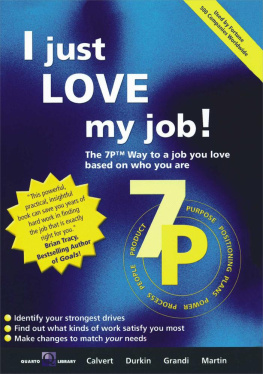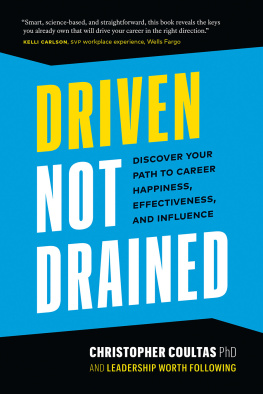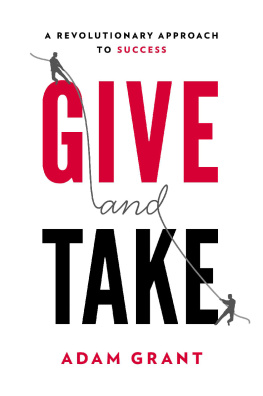Part I. Putting Things in Perspective
Introduction
I have so much to give in my work! I just want to be able to make my contribution put some of me into the work I do....
This comment, from a new entrant to the world of work, is typical of the enthusiasm and frustration of many people in the early days of their careers. But many of us feel the same frustration our jobs dont tap our talents or fulfil our drives. In the last few years, a lot of management literature has focused on tapping the creative potential that lies within people in all of our organisations. Yet many employers have lost the resources of loyal, committed and undoubtedly creative people by not recognising and harnessing that potential.
This is a book about how you can influence your working life and develop for yourself situations that reward and nourish you. It is a book for the countless thousands of talented people who want to take more control over the work they do, whether they be ambitious young executives, mid-life career changers or simply those who feel that working for an organisation could and should fulfil them more than it presently does. We firmly believe every person should be able to say, I just love my job!
These days, most of us expect that we will have a number of employers during our working life. This new pattern, and other changes in our work environment, have made it critically important for people to take individual responsibility for their own personal development. Organisations still support and encourage the development of their people. But unfortunately, many cannot offer the structured stages of job progression that used to take care of employees from their hiring day until their retirement.
As mergers and restructuring become the norm, theres much more fluidity in the movement of workers between organisations. There is also a bewildering proliferation of rapid change within many organisations. In this fluid, changeable environment, the opportunity for role and responsibility change has never been greater. People who clearly understand their own needs and drivers will be better placed to choose or shape roles, or to influence their areas of responsibility, in ways that suit them best.
You may have found this book while browsing in a book shop, looking for some new insights in self-development or career management. It may be that your manager has handed you this book, or it has been recommended by your HR department, perhaps leading you to ask, Whats in it for my company? As part of this self-development process, organisations benefit greatly. True, some lose good people to more enlightened companies or to self-employment, but others reap the rewards of a motivated workforce that is gaining intrinsic satisfaction from the work it does.
The issue, for us, is whether the initiative for developing human resources comes top down or bottom up. Many of the initiatives we have seen have failed through top down strategies. As Naisbitt said in Megatrends, fads are imposed from the top down, trends grow from the bottom up.
Trends are very powerful because they start slowly bottom up and develop a momentum that becomes unstoppable until, when a critical mass is reached, they become the order of the day. Consider the current greening of society. Few of us, a decade ago, could predict the way that recycling, energy credits, global warming, holistic health and other trends have become mainstream drivers for policy and action. The grass-root concerns built from the bottom up.
The same is happening right now within organisations a steady growth in the number of individuals who recognise that if they are to spend the majority of their waking life engaged in some kind of work activity, then that activity needs to fulfil them more than a pay cheque ever can. The time has never been riper for this change to gather speed.
It is now well-known that in recent years, we have moved into a period of severe skill shortages in many important sectors. Demographic changes have meant that fewer 16-year-olds as a percentage of the total population have been entering the labour pool. Employment for the under-30s has turned into a sellers market for people who have the right skills. The annual university and college recruitment drive for students has turned upside down in some sectors, with students interviewing companies rather than the other way round. A quick glance at the situations vacant section in your newspaper demonstrates the degree to which the world of work has changed in recent years. The job titles now advertised were not on the lists of the school and college career advisors who counselled todays potential candidates for these roles.
One of the major issues for organisations has been how to attract and retain competent staff. Many forward-looking organisations have developed ranges of benefits to mitigate against talent losses: setting up crche and playgroup facilities for the children of employees, calling on the over-50s to come back to work, offering bounty-hunter payments for employees who attract friends to work for their organisation. Some are laying the foundations of Employee Development Programmes that go far wider than the needs of the job to encompass University degree courses, vocational Professional Qualifications, fitness and leisure pursuits. It is not uncommon for organisations to have a catalogue of benefits which employees pick from, with packages that are designed to appeal to individuals with different lifestyles and values. Organisations that have improved their benefits and polices to better meet the needs of their employees report significant decreases in staff turnover, plus savings in recruitment costs.
Tom Peters and many others consider the Nineties to be a revolutionary decade, and that was before the common use of the Internet and web technologies. In fact, we are in the midst of the most dramatic changes in basic business organisation in over 2,000 years. There have been casualties: some organisations have gone under, some have merged or been taken over. Some jobs have changed or disappeared, and employees in many sectors who had once anticipated a stable career progression have found unexpected diversions. This change has been accelerated by the enormous increase in individually variable employment contracts and by the disappearance of the company pension, especially as this trend spreads into the public sector.
The trends and changes in work have brought opportunities or problems, depending on how you view them. For those who know what they want and what they have to offer, the opportunities of this fluid work environment have been genuinely rewarding. The changing work environment continues and the portfolio career has become more commonplace. For those looking to create or shape , rather than follow , their career paths, the variety, fluidity and opportunity have never been so great.
The purpose of this book
This book will help you to know who you are, where you want to be, and how you get there. It will enable you to understand your predominant drives and motivations and how these shape your life and approach to work. It will enable you to understand your strengths and limitations and give you greater choice and control over your careers.







